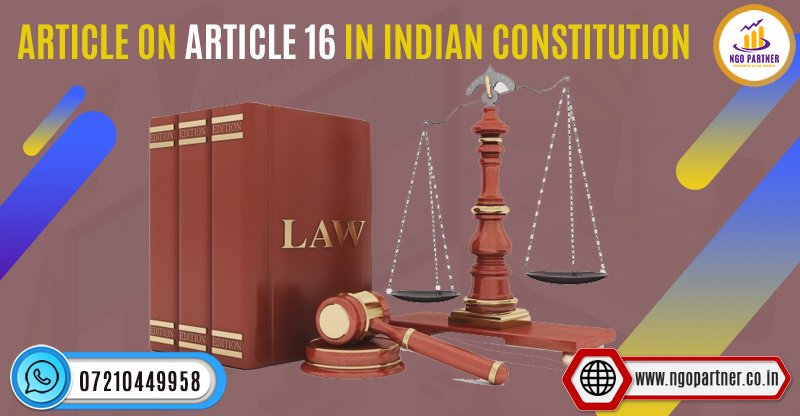
- June 12, 2023
- NGO Partner
- 0 Comments
- 1225 Views
- 0 Likes
- Marketing Company Blogs
Article 16 of the Indian Constitution: Equality in Public Employment
Article 16 of the Indian Constitution
In a nation founded on the principles of equality and justice, ensuring equal opportunities in public employment is of paramount importance. Article 16 of the Indian Constitution stands as a beacon of hope, upholding the ideals of equality and non-discrimination in the realm of public employment. With its unwavering commitment to provide equal chances for all, Article 16 plays a pivotal role in shaping a fair and inclusive society.

The Indian Constitution, a living document enshrining the rights and aspirations of its citizens, serves as the bedrock for safeguarding their interests. It lays down the framework for governance, protecting fundamental rights and ensuring social justice. Within this framework, Article 16 stands as a significant provision, safeguarding individuals from discrimination based on religion, race, caste, sex, descent, place of birth, or residence when it comes to public employment.
This blog will delve into the intricacies of Article 16, exploring its provisions and their implications for ensuring equal opportunities in public employment. It will shed light on the scope and application of Article 16, analyzing its significance in promoting inclusivity and representation. Moreover, it will address the challenges faced in implementing this constitutional provision and propose reforms to strengthen its enforcement. By understanding the essence of Article 16, we can collectively strive to build a more equitable society, where every individual has a fair chance to thrive in the realm of public employment.
Understanding Article 16 of the Indian Constitution
Article 16 of the Indian Constitution stands as a pillar of equality, ensuring equal opportunities in matters of public employment. This vital provision guarantees that no citizen shall be discriminated against on grounds of religion, race, caste, sex, descent, place of birth, or residence when it comes to public employment. By prohibiting such discrimination, Article 16 paves the way for a fair and inclusive society.
The objective of Article 16 is crystal clear: to eliminate any form of bias or prejudice in public employment. It aims to establish a level playing field where merit and qualifications triumph over factors beyond an individual’s control. By upholding the principles of equality and non-discrimination, Article 16 sets the stage for a just and equitable society.
Scope and Application
The scope and application of Article 16 are broad and far-reaching, encompassing various aspects of public employment. This includes recruitment, appointment, and the conditions of service. Article 16 ensures that the selection process for government jobs is conducted on the basis of merit and competence, free from any bias or favoritism.
While Article 16 promotes equality, it also acknowledges the need to address historical disadvantages faced by certain sections of society. Hence, it provides for exceptions and safeguards, such as reservations for socially and educationally backward classes. These reservations aim to uplift marginalized communities and create opportunities for their socio-economic progress.
Understanding the intricacies of Article 16 is crucial for both job seekers and policymakers. By familiarizing themselves with its provisions, aspiring candidates can assert their rights and demand equal treatment. Policymakers, on the other hand, can design inclusive policies that promote diversity and representation in public employment.
Significance and Impact Article 16 of the Indian Constitution
Article 16 holds immense significance in shaping public employment practices and upholding the principles of equal opportunities and social justice. By guaranteeing equal access to government jobs, Article 16 plays a crucial role in promoting meritocracy, ensuring that individuals are judged based on their abilities rather than their backgrounds. It serves as a powerful tool in breaking down barriers of discrimination and fostering a diverse and inclusive workforce.
Numerous landmark cases and judgments have further reinforced the impact of Article 16. For instance, the Indra Sawhney case, commonly known as the Mandal case, upheld the reservation policy for socially and educationally backward classes. This decision aimed to address historical inequalities and promote representation in public employment. Such judgments have not only provided relief to marginalized communities but have also set important precedents for ensuring fairness and inclusivity in the recruitment process.
Challenges and Reforms
While Article 16 has made significant strides in advancing equal opportunities, challenges persist in its implementation. One challenge lies in striking a delicate balance between ensuring reservation benefits for underrepresented groups and avoiding reverse discrimination. Designing effective reservation policies that uplift the marginalized while not depriving others of opportunities remains a complex task.
To strengthen the enforcement of Article 16, reforms are necessary. This includes developing transparent and merit-based recruitment processes that consider diverse perspectives. Additionally, there is a need for robust monitoring mechanisms to ensure that reservation policies are implemented effectively and do not perpetuate inequality. Promoting skill development programs and providing equal access to education and training opportunities can also enhance the employability of individuals from disadvantaged backgrounds.
In conclusion, Article 16 of the Indian Constitution plays a pivotal role in ensuring equality and non-discrimination in public employment. Throughout this blog post, we have explored the provisions, scope, and impact of Article 16, highlighting its significance in promoting equal opportunities and social justice.
We have seen how Article 16 aims to eliminate discrimination based on various factors and provides safeguards to uphold the principles of fairness and inclusivity. Landmark cases and judgments have further reinforced the importance of this constitutional provision in shaping public employment practices.
As responsible citizens, it is crucial for us to understand and advocate for equal opportunities in public employment. By embracing diversity and recognizing the value of representation, we can contribute to the creation of a just and inclusive society. Let us strive to support reforms that strengthen the enforcement of Article 16 and ensure that every individual, regardless of their background, has an equal chance to thrive and contribute to the progress of our nation.
Together, let us champion the principles of equality and non-discrimination in public employment and work towards building a society where everyone has an equal opportunity to succeed.




Leave a Comment